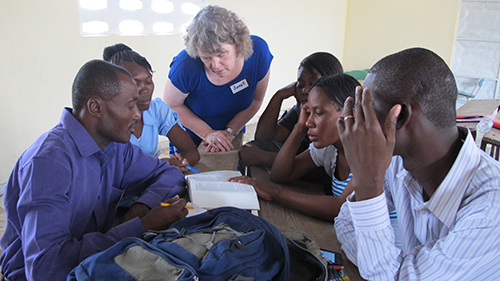University of Arkansas professors Vicki Collet and Janet Penner-Williams went to Haiti to teach for a few days this summer, but the two say they also learned valuable lessons.
Penner-Williams is assistant dean for academic affairs and associate professor of curriculum and instruction in the College of Education and Health Professions. Working through a teacher exchange program run by a nonprofit organization called the Global Orphan Project, she made her third trip to the Caribbean nation, which experienced a devastating earthquake in 2010 and is still recovering. She invited Collet, an assistant professor of childhood education with a specialty in literacy, to attend with her this August.
They may have come from a prosperous area compared to the impoverished community they visited in Haiti, but the two women said the trip was useful to them as well as to the Haitians they taught.
"We all bring different skill sets, such as the Haitian teachers' way of incorporating music into their teaching," Collet said. "When I think about what I learned it was that, as an educator, you have to use the resources you have. That was emphasized by the coordinator of the program. Haiti is a developing country with very minimal resources such as school supplies."
The country has very few public schools and not many children get to attend school, Penner-Williams said. The 2010 earthquake left many children orphaned, she said, and other parents are so poor they have left their children at orphanages so they will have an opportunity for an education.
Penner-Williams and Collet gave professional development presentations at an orphanage school in Croix de Bouquet outside the capital city, Port-au-Prince. About 50 preschool through eighth-grade teachers from the surrounding area attended the four-day training. The people speak Haitian Creole, so a translator was required for communication.
Internet access was spotty and electricity was not available 24 hours a day. Paper for classrooms was scarce, and Penner-Williams and Collet collected supplies they could take to Haiti in their suitcases, including markers, journals, pens, binders and other reusable materials.
Penner-Williams said she learned the importance of being flexible. Each day, she and Collet adjusted their plans, often because translation increased the time needed to teach each lesson. The teachers also stopped what they were doing to pray several times a day.
"We had a general plan but every day we revamped what we would do the next day," Collet said.
It was nice to go with the flow, Penner-Williams said, to live in the moment.
"We were able to expose them to different teaching strategies they hadn't tried," she said. "Group work was also something they were not familiar with. Their teaching is more in the traditional lecture mode. We wanted to be careful about what we showed them so that it was something they could use. We based activities on items they had or could get such as pebbles or bottle caps."
Collet demonstrated how to use a writing roundtable with students and how to use Venn diagrams to show similarities and differences between words and concepts, as well as techniques for sequencing information and lesson planning. Children came into the classroom for about 45 minutes at the end of the day so that the teachers could use the new techniques they had learned.
The experience was particularly satisfying because of the self-sustaining nature of education.
"We believe, if we can help them with education, they can help themselves," Penner-Williams said. "A young man who helped his family survive the aftermath of the earthquake by growing vegetables came to speak with us and brought soil for a planting project we did. He was emphatic, telling the teachers, 'It is up to us. Nobody else can heal our country.' He had gone through a vocational training program in agriculture that was provided by the Global Orphan Project."
The two plan to write about their experiences for submission to peer-reviewed journals.
"My research interest is professional development," Collet said. "This was an opportunity for me to look at it through the lenses of cultural diversity, translated delivery and different resources. We interviewed several of the participants and the other teachers who accompanied us and kept field notes."
Collet said she would like to go back.
"It was a powerful experience, a life-changing experience," she said.
"It was a situation in which we felt what we were doing will really make a difference in the lives of people in the community," Penner-Williams said.
Contacts
Heidi Wells, director of communications
College of Education and Health Professions
(479) 575-3138, heidisw@uark.edu
